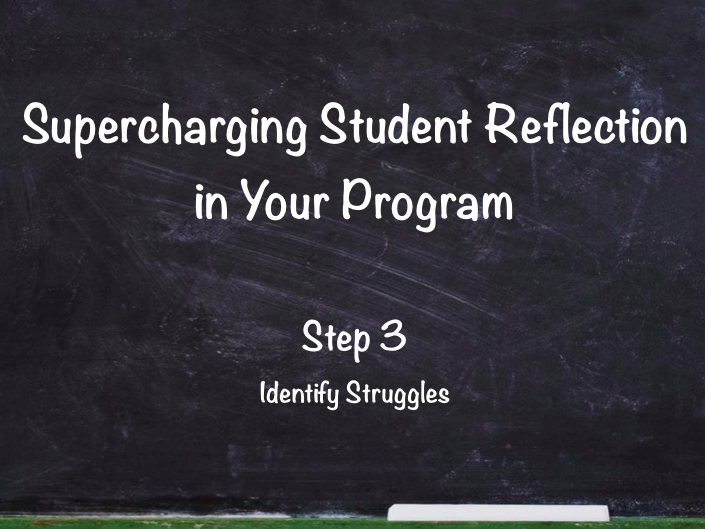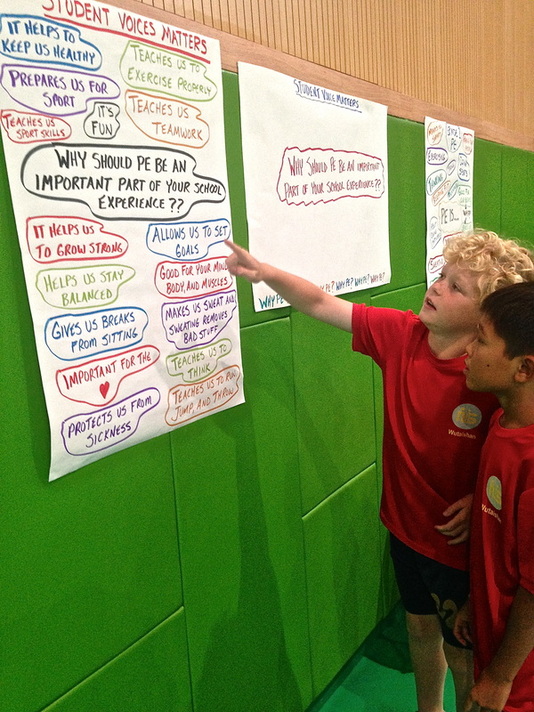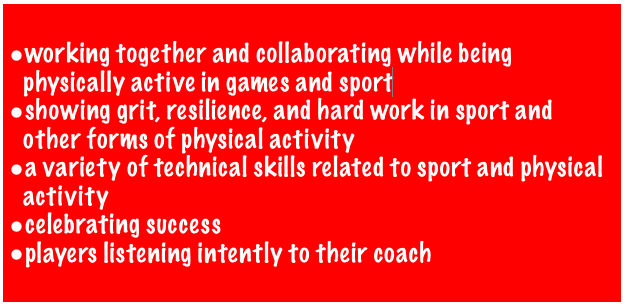|
Before getting into Step 3 of my ‘supercharging student reflection’ blog post series, I want to re-emphasize that making reflection a regular part of the student experience in physical education requires a great deal of structure and is no easy task to deliver with consistency. I’m not trying to scare you away from trying to deepen the reflection process in your program, but just remind you about the idiom that I referenced in Step 1 of this series, “Life is a marathon and not a sprint!!” Trying these ideas out is like training for and ultimately running a marathon. It takes time, commitment, and determination. Although the idea of journal writing (reflection) might appeal to teachers, the management of supplies, time, and feedback might be daunting (Parker & Cutforth 1996). However, there are distinct strategies that can be applied to make the process more viable in the long run. I will discuss strategies that I have used in the past in upcoming blog posts, as well will share what some of the research has shown to be effective in making student reflection a more regular part of your physical education program. I’d like to now move into Step 3 of my ‘supercharging student reflection’ blog post series. In Step 2 of the process, students were exposed to the visual that was created to help make explicit the reasons why they felt that PE was an important part of their school experience. They were also given opportunity to add further ideas to the visual. As we begin to broaden out and add to the visual of student ideas related to why physical education should be an important part of their school experience, it is necessary to begin to have discussions with the students about potential obstacles, road blocks, and challenges that they face in regards to what may prevent them from achieving success in PE. Having this important dialog and opening up these discussions with our students will allow them to hopefully look within themselves and to initiate a process by which they can begin to identify what potentially holds them back from demonstrating the traits, mindset, work ethic, and other affective aspects necessary to embrace being physically active for life. After all isn't that what our ultimate aim as physical educators is, to get students to embrace being physically active for life???!!!! There is a distinct possibility that at this point, you may very well have to step in to ask further key questions. Chances are the students will not identify all of the big ideas why PE should be an important part of the curriculum and a critical part in their school experience. If you run out of space in the initial visual, you can simply create another one to pair with it. However, it is important that all of the biggest, most important ideas are all posted as we move forward in Step 3 of the process. Provocation Time: As the students come into the gym, there are a number of different provocations that can be used at this point. The point of the provocations areplea about emphasizing the affective aspects of the PE and sport experience. Perhaps, it’ll be videos and photos of students and adults: Step 3 is all about students beginning to get their heads around goal-setting and in doing so, they must address where they fall short or need to improve. It is critical that we steer students away from identifying or singularly focusing on a specific physical skill related to PE and sport. As physical educators, if we are to get our students to embrace being physically active for life, it is my firm belief that goals such as ‘I want to be better at corner kicks’ or ‘I want to run faster’ or I want to throw farther are not the way to go. CLARIFICATION TIME!! Wait a minute here, please refrain from wanting to hit me on the head with an empty Merlot bottle! Please do not think that in any way I do not believe how critically important individual skill development is in PE. The development of physical skills is an absolute must in any PE program. However, when trying to get students to find a joy and love of being physically active for life, we must begin with the affective domain. If we can address the affective domain, we are helping the students develop the tools necessary to understand and believe in themselves. In winning this battle, the students pursuit of developing the necessary physical skills in PE and sport becomes so much more reachable and attainable. Therefore, in moving forward in Step 3, we have to have discussions with our students about their personal and social selves. And factored into these discussions are critical topics such as self-worth, self-confidence, respect and sensitivity towards others, responsibility, cooperation and fair play (Parker & Cutforth 1996). Once these important aspects have been emphasized and discussed, we are now ready to truly move forward with authentic goal-setting in our PE program. TIME to DIGEST The students are not going to be able to handle everything at once and will need some time to digest all of the discussion that has taken place. Step 3 of the process may take a few classes for the students to get their heads around things. Perhaps it’ll take 3 or even 4 classes. I recommend that you give the students 5-7 minutes of sharing and discussing by getting them to do a walk & talk at the start of each class. Continue to jot down in your journal any major discussion points that stick. Give a few minutes to have a group discussion. Here is an example of a key question that could be used to initiate dialog and discussion about identifying obstacles, roadblocks and challenges that they may face. Tell them that they must keep reflecting and thinking about this key question. You could even send an email home to parents letting them know that the students are about to goal-set in PE and that it is important to have discussions with them about the key question.
However you complete this step of the process is entirely up to you, but what is most important is that you get the students beginning to narrow in on a specific goal that they will create for themselves to begin the reflection process in PE. This goal can and should transcend any particular unit and be all encompassing in nature. They should be able to carry their goal with them over from unit to unit throughout the semester. Step 4 is all about the goal itself and creating the tool to get students to begin reflecting with regularity in regards to their goal. Is anything unclear to you at this point? Do you have any comments or questions. If so, please fire away in the comment box below. Thanks for reading!!
1 Comment
8/18/2015 07:23:45 am
Hi Andy. I am hugely enjoying this insightful blog series on student reflection. Whilst I do agree with you that the affective domain is hugely important, my understanding is that all the domains of learning in PE should be of equal importance. If we are looking to build our students ability to critically reflect on their current performance, development and learning in PE, then we need to get them to look at all the domains. from there they can start to make the best choices for them to develop. Take for example the following hypothetical situations: Child A has high motivation, but always argues with the officials. Child B enjoys participating, but struggles with spatial awareness and balance. Child C has good motor control but never works to the best of their ability. They need to be able, with advice and support from us, to see their strengths and the area of improvement with out favouring one domain over the other. Keep up the excellent work. I look forward to reading the rest of the series.
Reply
Leave a Reply. |
AuthorKAUST Faculty, Pedagogical Coach. Presenter & Workshop Leader.IB Educator. #RunYourLife podcast host. Archives
September 2022
|
- Welcome
- All Things Teaching and Learning
- The Aligned Leader Blog
- Consulting and Coaching Opportunities
- My TED X Talk
- My Leadership Blog
- Run Your Life Podcast Series
- How PYP PE with Andy Has Helped Others
- Good Teaching is L.I.F.E
- The Sportfolio
- Example Assessment Tasks
- PYP Attitude Posters (printable)
- Publications





 RSS Feed
RSS Feed
